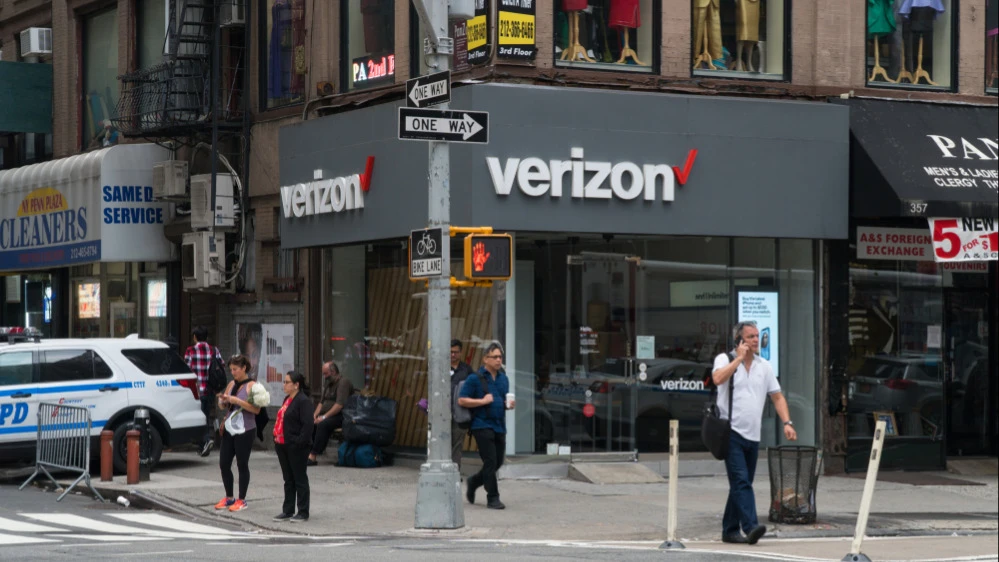Verizon's subscriber count falls for the second consecutive quarter. Why is the company's stock rising?
Citi notes that Verizon maintains a high dividend yield, reflecting its ability to generate sustainable cash flow

Verizon Communications, the largest U.S. mobile operator by subscribers and network coverage, reported a second consecutive quarter of monthly subscriber churn. However, the company beat analysts' revenue and profit expectations and improved its full-year forecast. Verizon shares rose 4.7% in Monday trading.
Details
Mobile carrier Verizon's subscriber base declined by 9,000 in the quarter, contrary to analysts' expectations who predicted a net gain of 13,000, according to FactSet, writes MarketWatch. By comparison, the company added 148k monthly-paying subscribers a year ago.
Still, Verizon managed to beat revenue and profit expectations, noted The Wall Street Journal. Verizon's second-quarter revenue increased 5.2% year over year to $34.5 billion. Net income rose nearly 9% to $5.1 billion. Its key business, mobile services, generated $20.9 billion in revenue, up 2.2% from a year earlier.
The company continues to expand its fiber connections to subscribers. Verizon added 293 thousand broadband connections. However, this is less than it was last year (391 thousand). The total number of Internet customers reached 12.9 million. Fixed wireless connections also slowed: 278 thousand versus 378 thousand a year ago. At the same time, the company said that it is confidently moving towards the goal of 8-9 million such connections, the publication notes.
Verizon raised the lower end of its earnings guidance for the year, citing the effect of tax reform and strong results in the first half of the year. The company now expects adjusted earnings per share growth of 1-3% for the year.
Verizon shares rose 4.5 percent to $42.7 in Monday trading.
Context
Competition between the largest U.S. mobile operators remains fierce, WSJ notes. Throughout the year, Verizon's competitors have been running aggressive promotions to lure so-called switchers - customers willing to switch carriers for a better price. In April, Verizon promised to freeze prices for some customers for three years to preserve its subscriber base. Before that, the number of postpaid users decreased by 289,000 subscribers in the first quarter. Verizon attributed the decline to decreased purchases from federal agencies amid spending cuts by the Donald Trump administration, including the Elon Musk-led DOGE department.
In addition, the operator faces stiff competition in the home Internet segment, the publication notes: fixed wireless communication (FWA), which does not require laying cables and provides consumers with an alternative to traditional providers, is gaining popularity.
What the analysts are saying
Citi reiterated a "buy" recommendation on Verizon shares after the release of its quarterly report and maintained its target price at $48, expecting a 17.5% upside, reports Investing.com. The investment bank notes that Verizon maintains a high dividend yield of 6.64%, reflecting its ability to generate strong cash flow. Citi believes that Verizon shares have upside potential in the short term, given exceeding expectations on key metrics amid cautious investor sentiment ahead of the report.
Morgan Stanley resumed coverage on shares of Verizon with a Neutral rating (Equalweight) and a $47 target price, noting the balanced risk/reward ratio of the securities.
BofA Securities also reinstated coverage on Verizon stock, giving it a neutral rating with a $45 target price. The investment bank noted the growth of premium mobile customers and a strong strategy in the development of the fiber-optic segment.
In total, of the 28 analysts tracking the performance of Verizon stock, 15 recommend holding it in their portfolios (Hold), 12 advise buying (Buy and Overweight), and one advises selling (Underweight). The Wall Street consensus forecast is for $47.6, up 16.6% from Friday's closing price.
This article was AI-translated and verified by a human editor
